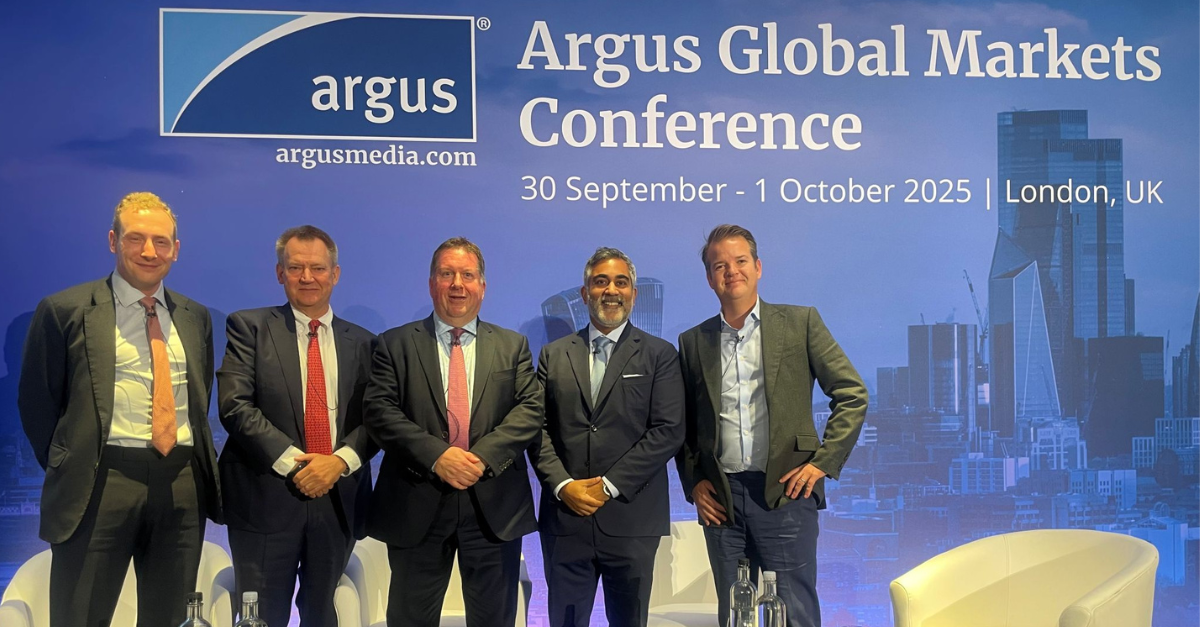The HC Commodities Podcast was invited to host a panel at the Argus Global Markets Conference in London on September 30. The discussion explored how the commodities world is adapting trading strategies to markets increasingly driven by Truth Social, algorithmic sentiment, shifting geopolitics, and growing government intervention. In today’s environment, the fundamentals of supply and demand are only part of the picture.
Is this a new phase for global markets—or simply a reversion to a more normal world? Are the shifts cyclical or structural? And what do these dynamics mean for the skillsets and participants in commodities trading?
Speaking with our host Paul Chapman, the panel featured leading voices in the industry:
- Saad Rahim, Chief Economist at Trafigura
- David Fyfe, Chief Economist at Argus Media
- Nick Kumleben, Energy & Commodities at Greenmantle
- Kurt Chapman, legendary oil trader and Director at Levmet
This panel provided deep insights into the future of commodities trading, market sentiment, and the forces reshaping the global energy and resources landscape.
Read below for our key talent impacts from this episode.

Key Talent Impacts
Is geopolitical fluency now becoming a core trading skill?
In the energy and commodities sector, talent can no longer focus solely on supply and demand fundamentals. Traders and analysts must interpret shifting geopolitical dynamics, sanctions, tariffs, and policy changes — often in real time. The ability to read political signals in Washington, Brussels, Beijing and beyond is now a critical skill, directly shaping trading strategies and risk management.
Do organisations need talent that goes beyond resilience to become genuinely “antifragile”?
Resilience is no longer enough in the global commodities trading market. Companies now seek professionals who can thrive in volatile environments and turn disruption into opportunities. This requires an adaptive mindset, where talent can pivot between financial tools and physical assets, making the business stronger when markets are unstable.
How critical is the convergence of physical and financial skillsets for future trading talent?
The most valuable talent in commodities today blends physical and financial expertise. Hedge funds are moving into physical markets while major trading houses are hiring quants, AI specialists and data scientists. Future-ready professionals will understand logistics, shipping, and storage, as well as advanced analytics, creating hybrid skill sets that deliver a competitive edge across both domains.
Is the expansion of political risk and intelligence functions reshaping the skills firms prioritise?
Trading companies are rapidly expanding their political risk and intelligence capabilities. In-house teams in Washington, Brussels and other capitals reflect the rising influence of government policy on commodity flows. Talent in regulatory affairs, geopolitical analysis and intelligence is now as essential as commercial acumen, reshaping the recruitment priorities of leading energy and commodities firms.
Does greater capital intensity risk widen the talent divide between large trading houses and smaller players?
Scale and access to capital are becoming decisive factors in commodities talent. Large trading houses with billions in credit lines and global infrastructure can attract the best professionals and build multidisciplinary teams. Smaller firms, lacking such resources, struggle to compete for top talent. This capital intensity is widening the talent divide and reinforcing the dominance of the biggest players in the market.
HC Group is a global search firm dedicated to the energy and commodities markets.
Explore the full HC Commodities Podcast archive
HC Commodities Podcast Briefing
Edited highlights and themes from the podcast episode.
Is volatility in commodity markets really increasing?
While headlines often suggest turmoil, measured volatility in key commodities such as oil and copper has remained relatively contained. Prices have experienced sharp single-day swings but have broadly held within ranges. The real challenge lies in distinguishing between “good” volatility, such as redirection of trade flows, and “bad” volatility driven by political headlines and inconsistent policy announcements.
How significant is the impact of geopolitics on supply flows?
Despite sanctions, conflicts, and tariff threats, global supply flows have largely adjusted. Russian and Iranian exports, for example, continue to move, albeit at discounted prices. The greater disruption comes from uncertainty—when tariffs or sanctions are announced, altered, or withdrawn within days—making it harder for traders to plan positions with confidence.
Why has trading performance been so mixed?
Volatility normally creates opportunity, but only when it is directional. Recent years have seen violent intraday swings without clear trends, creating stress for financial traders. Larger firms with physical assets have been able to rely on fundamentals, while smaller entities often struggle with unpredictable price moves.
Is current volatility structural or cyclical?
Many believe today’s environment reflects a structural shift. Geopolitical tensions, government intervention in energy security, and questions over the dollar’s role all suggest a longer-term cycle. Yet markets remain resilient, with supply and demand adjusting through price mechanisms.
What strategies are proving most effective?
Adaptation now requires a stronger focus on geopolitical awareness, diversified assets, and flexible financing. Options markets are being used more actively to manage risk. Importantly, traders are moving beyond resilience toward an “antifragile” mindset—seeking to grow stronger by turning volatility into opportunity.



